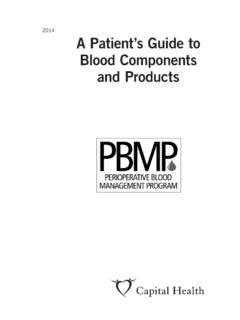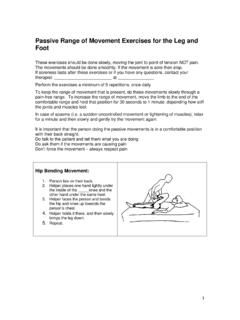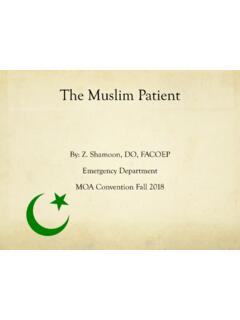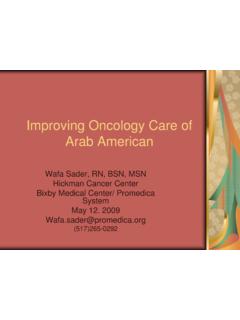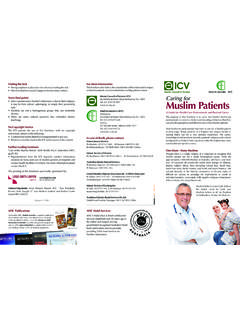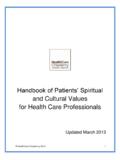Transcription of Caring for Muslim Patients and Families during Ramadan
1 This document was prepared in partnership and consultation with the IWK Primary Health team, NSHA Central Zone Diversity and Social Inclusion and Cultural Health Interpretation Services. Updated June 12, 2015 Caring for Muslim Patients and Families during Ramadan Respect for spiritual and religious beliefs and practices is an important part of patient-and family-centred care within Nova Scotia Health Authority. The following information on Caring for Muslim Patients and Families during Ramadan is meant as a guide to help staff, volunteers and physicians. Muslim Patients and Families come from many different countries and cultures. Please be careful about assumptions as cultural and personal nuances often influence religious observance.
2 Core religious practices may be the same, but the needs of each Muslim patient and family should be determined through open and direct communication on a case-by-case basis. General Guidelines Ramadan is the ninth month of the Muslim calendar and is one of the most important times for extra spiritual consciousness, social Caring , charitable actions and other duties considered sacred to Muslims. during the month, between dawn (the time that marks the beginning of daylight) and sunset, Muslims who are physically capable and can safely do so observe a daily fasting from food, drink, intimacy and other impermissible actions in accordance with the Islamic faith. The starting and end of Ramadan is based on a lunar (movement of the moon) calendar.
3 It is, therefore, about a week and a half earlier every year, in relation to the Gregorian calendar. Only capable adults are required to fast. People who are travelling or whose health might be affected if they fast, such as children, the sick, the frail elderly, pregnant and nursing mothers are allowed to skip fasting while their circumstances last. There are extra worship activities at night and predawn time in Muslim households, in addition to such tasks as food preparation, all of which may have a toll on daily activities. Usually, people do not feel offended when offered food by colleagues or friends who do not know or forget that a Muslim is fasting. So, if you offer and suddenly find out, do not feel bad about it - your kindness is usually appreciated.
4 Remember that many people who fast spend time around food in their houses, especially if there are little ones who have to eat. To be sensitive, you may avoid early-morning appointments and food-based events such as barbecues in the day time with people who are fasting. You may hold food-based events during times that coincide with the breaking of the fast. However, Muslims who are fasting do not expect others to change normal routines and events. Each person, family or community may have their own subtle preferences so remember that the best source for individual care and accommodation is the colleagues, Patients and clients you are working with, so always ask what is OK for them. Above all, celebrate with them and, if you are a manager, try to give time to celebrate Eid-ul -Fitr (the feast and holiday following Ramadan ) at the end of the fasting month.
5 This document was prepared in partnership and consultation with the IWK Primary Health team, NSHA Central Zone Diversity and Social Inclusion and Cultural Health Interpretation Services. Updated June 12, 2015 Lastly, remember that Ramadan is a spiritual journey meant to increase strength in many ways; yet, it is a big change and adjustment for fasting people and can be a bit slower for them, especially in the beginning of the month. Understanding is hence required, but not worrying or sympathy. Clinical Care Team and Organizational Considerations Here are some basic considerations when hosting events during Ramadan and/or with Muslim partners: Have Halal food offerings as part of cafeteria and food service offerings.
6 There are a couple of Halal food stores in Halifax, including House of Halal on Titus Street and Taibah on Gladstone Street. Research prayer times in advance, so you know when your colleague, patient or family member may need to pray. There are five regular prayer times every day. Research in advance the direction of Mecca, Saudi Arabia, relative to your location. Have a separate private space set aside, if possible, for people to pray (check the area in advance), preferably without photos/pictures on the wall. This space can also be useful during meal and break times if people would prefer not to be around while others are eating, if your event/location also has food. Find out in advance where people may be able to perform Wudu (ablutions) before their prayers and that the space is clean and accessible.
7 A clean wash area with a sink (bathroom, kitchen) may suffice, or a wash basin for Patients who may not be able to leave their bedside. Have prayer mats available; if that is not possible, then two or three clean, plain (no patterns or pictures) sheets can suffice, depending on the space and number of people. Be aware of learning needs of people who are fasting in terms of such concerns as concentration, fatigue, attention. If you have food at your event, offer food to people who are fasting that they can take away (in paper bags, plastic containers) - giving people an option to participate in any meal offerings maintains an opportunity for inclusion, even if they may not eat right away; the chance to share is the important part.
8 Frequently Asked Questions What time is required for Eid-ul-Fitr? Eid-ul -Fitr starts the day after Ramadan . Eid is a three-day celebration, full of visiting with family and friends. On the first day of Eid, a special, communal Eid Prayer takes place, usually in the morning. After this prayer, community members may gather for a meal, visit family and friends during the day and have a feast for the evening meal. What is Halal? This document was prepared in partnership and consultation with the IWK Primary Health team, NSHA Central Zone Diversity and Social Inclusion and Cultural Health Interpretation Services. Updated June 12, 2015 The word "Halal" refers generally to all things that are permissible to do or have by a Muslim .
9 In food, Halal includes all safe and edible vegetables, fruits and seafood. A Halal slaughter of an animal means the invoking of the name of God at slaughtering by a monotheist (someone who believes in one God), such as a Muslim , Christian or Jew. Are there specific prayer times that we can identify for people? Prayer times are specific to the location of the sun and change frequently in the northern hemisphere and as such it is often good to be up to date with the latest information. Websites detailing prayer times in Canada are available on the Internet. The midday Friday prayer is an important prayer for Muslims to attend in congregation. What is Qiblah? (Sometimes spelled Qibla or Kibla, or referred to as Ka bah) Qiblah is the direction all Muslims face for formal prayers.
10 A Qiblah or Kibla locator is available on the Internet at A Google map pops up giving the direction based on your computer IP address. You can also enter your postal code - or move the indicator line to a specific location. What is Wudu (ablutions)? It is the cleansing with water that takes place before formal prayers. It includes washing the hands, mouth, face, arm, wiping the head and ears and washing the feet. Who do I call for Spiritual Care with Muslim Patients and Families ? The Spiritual Care team is the first place to turn. The team will help assess the situation and if necessary contact an Imam or Muslim faith representative in the community. Happy Ramadan !
